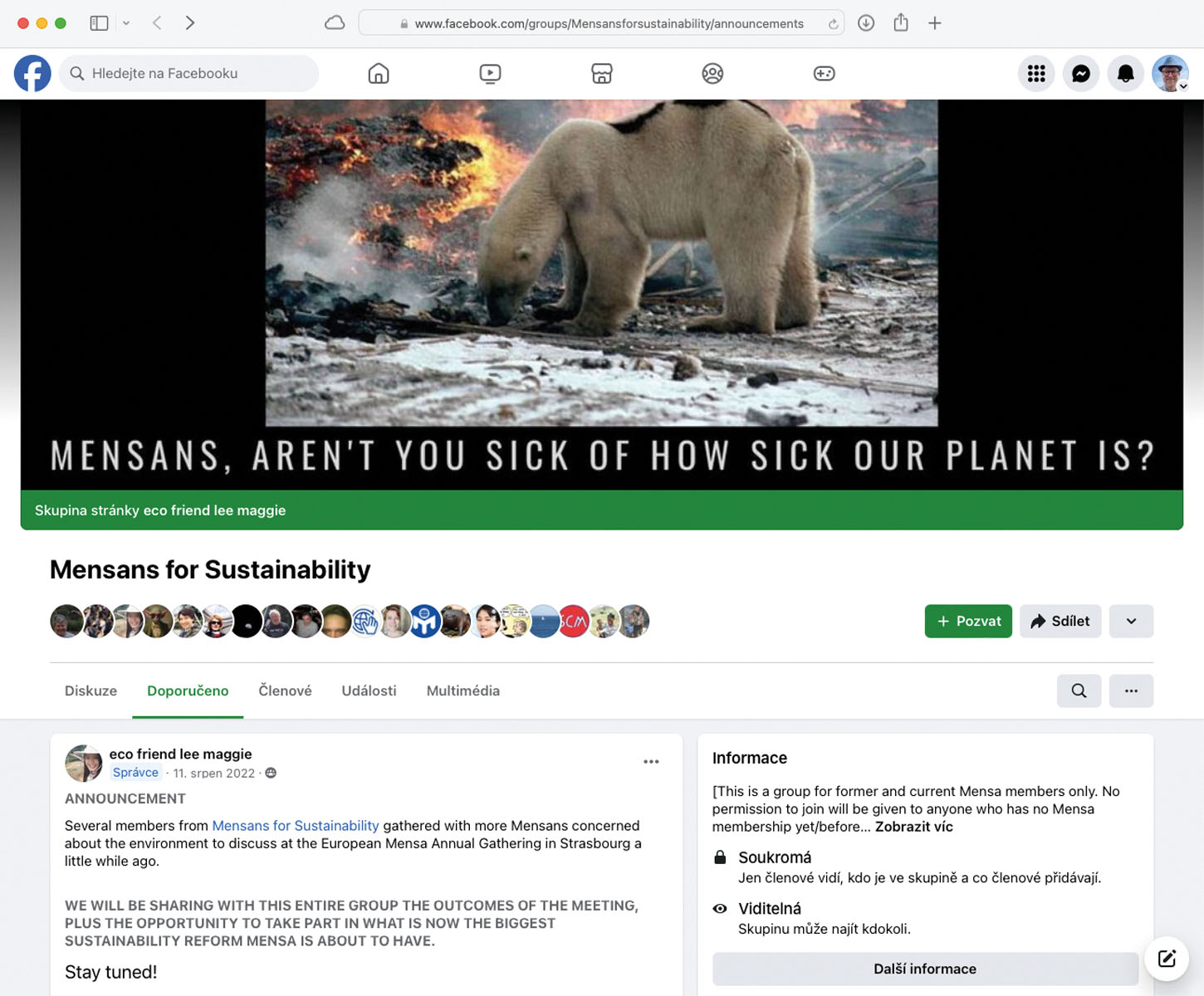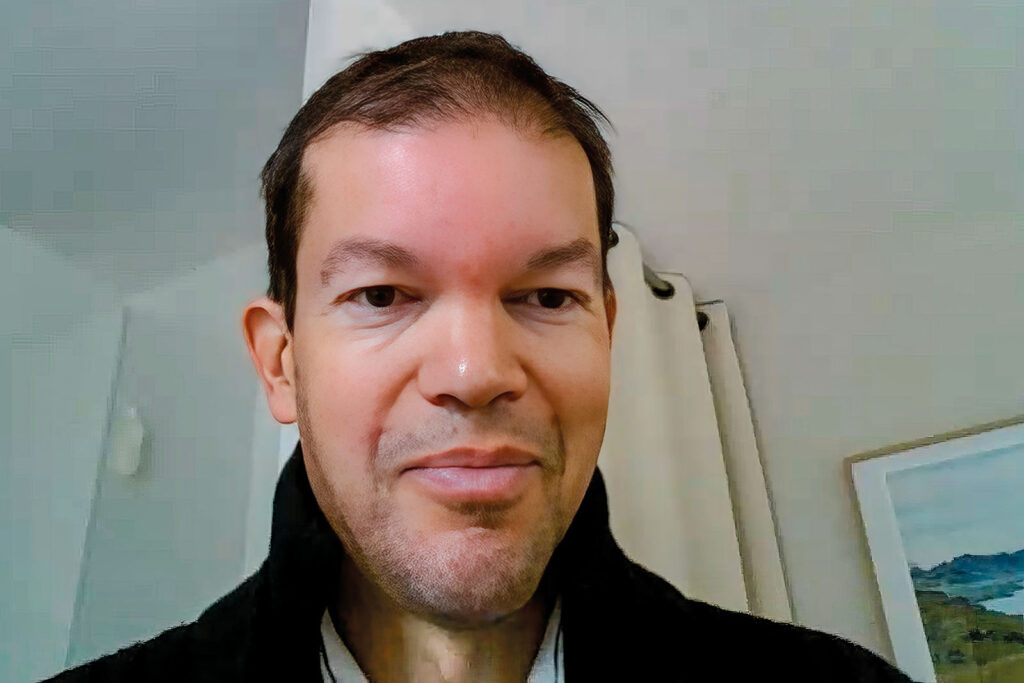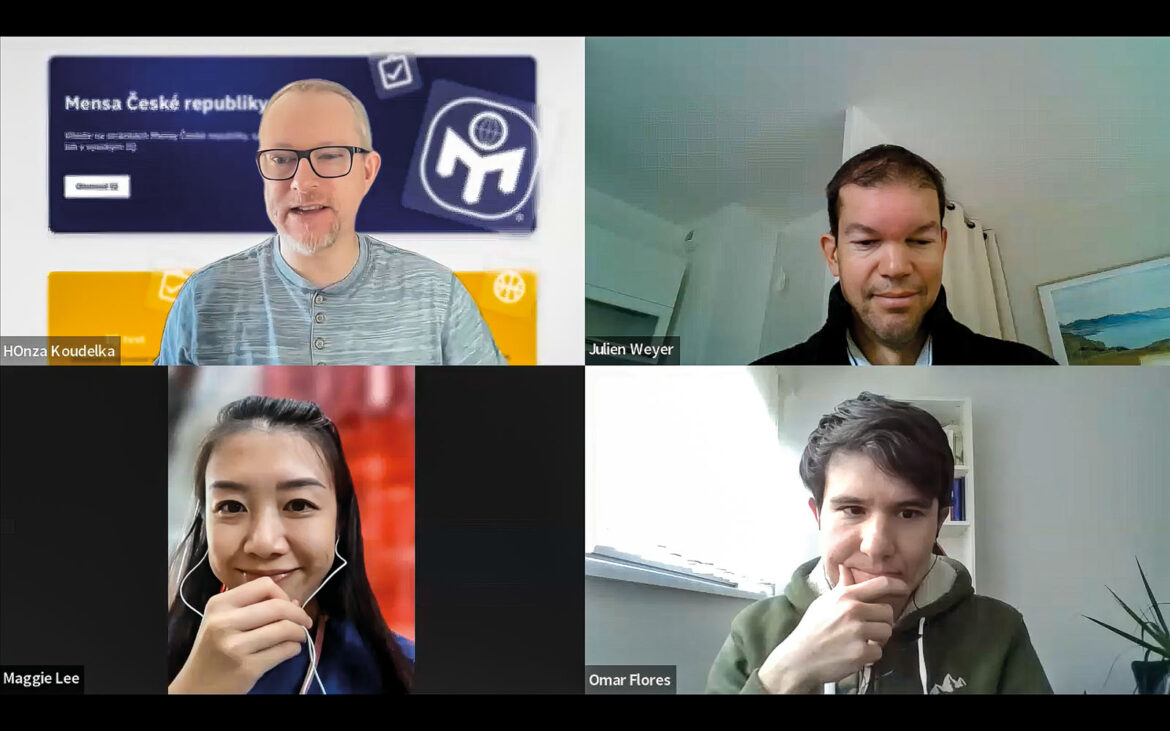
mensanthropist [ men-san-thruh-pist ] noun
a person, who actively participates in fulfilling one of Mensa’s objectives by fostering and utilizing intelligence for the benefit of humanity
Almost three years ago for the fifth episode of the Mensanthropist series I organized an online meeting with three members of the „Mensans for Sustainability“ group, Omar Flores, Julien W. and Martin Kleman. Half a year later, for the eights episode, I also interviewed Maggie Lee, founder of that group and one of the most active environmentalists within Mensa worldwide. As time has passed, I thought it might be a great idea to get together again and follow up on what we talked back then, see if there was any progress made, if any of us changed our opinions, and maybe come up with some action plan we could put together and share with the Mensa community. I finally managed to meet Maggie, Omar and Julien on the 4th of November 2023, and in the end, even though a bit late to the party, Martin joined us for a bit as well. So here’s what we talked about…
Omar, one thing you mentioned was that we are spending a lot of effort doing the research around environment, and there is a lot of people in the science part, but we may be missing an easy and efficient way to present results of the science. Have you seen any progress in this regard?
Omar: As you say, there is a lot of information, but for non-experts, it’s really difficult to differentiate what they can trust and what not. All the political polarization and all this constant fighting between different opinions makes people easily fall in the confirmation bias. Sometimes the things that environmental activists propose to face the problem are not going to make it better. And when you try to explain them, they also don’t trust you. People are very stubborn in their ideas, and it’s very difficult to present a real scientific evidence to form an informed opinion.
I got professionally involved in one of the models that are used by the Intergovernmental Panel on Climate Change (IPCC) to talk about different social and environmental scenarios estimated the environment. For example how all the carbon cycle will work in different situations. So I’ve gained a lot of knowledge about how all these predictions are made from the environmental part, the scientific development of these models. But there is a lot of rejection of these predictions because some people say that they are just mathematical inventions. I really find it super complicated to transmit what is a scientific knowledge to general public. Even if I keep trying, the success is very little, I’m afraid.
So you are still personally involved in the science. Is there anyone responsible for the next step, actually making it easy to understand and not only to general public, but also to decision makers?
Omar: I’m now with the team of developers that made ORCHIDEE, one of these big models. There are people doing the coupled model intercomparison project (CMIP). They compare the results of all these models and prepare the different scenarios that are transferred to the IPCC. Then all the experts of the IPCC review all the knowledge and prepare their reports. And then there are people in all these organizations within United Nations who later try to process the IPCC reports for policymakers and the society. I’m in the core of the people just making the tools, the models, and I have almost no contact with the people who later explain all these things.


Julien, you went a little bit farther in actually trying to do something in the community, specifically within Mensa. You mentioned that at EMAG 2022 a group was formed that started meeting on a regular basis. Tell us a little bit about those meetings.
Julien:
The idea was raised in 2022 EMAG in Strasbourg when the organizing team proposed a few workshops based on serious games, such as the Climate Fresk. There was a few other workshops, I also proposed a lecture on planetary boundaries. Then at the end of the that EMAG, there was a group that gathered to have a discussion on what could be the next steps. We decided that we could at least try to have some kind of a monthly meeting. With no particular agenda at that point, we just wanted to gather and see what we could do. A fellow Mensan from France, Sophie Rapenne, was very active in this respect. So those meetings have been taking place almost every month. There is a kind of an action plan on an Excel spreadsheet. Some of the actions were already taken, for instance Sophie wrote some guidelines for event organizers, so that Mensa events could be more sustainable or have a lower impact.
An article that was published in the Mensa magazine in France, a few other workshops were organized in some countries, in France and Germany mostly, which are the two countries where we have the most participants. Those monthly meetings usually gather between 5 and 10 people. We do have an official special interest group in France, which is simply called Mensans for Sustainability France. And we have about almost 100 members now. I’m very happy that those meetings could take place and we always share useful information, but it seems to be quite difficult to really gain some momentum.
Thanks to Sophie we now have a kind of a program where members will talk about specific issues each month. The first topic focused meeting was about planetary boundaries again because not everybody could attend the previous lectures. That was last month. This month Catherine from the UK will talk about her activities as a climate activist. And then we have a few other subjects that will be addressed in the coming months.
Maggie, what has ended up happening to you in the last two years?
I’m joining you from Bangkok, Thailand today. I think I was still with Verra or maybe the United Nations when I last talked to you, but I’ve since then gone back to WWF, and I now work there as a regional head for Europe and North Africa, and also the Asia Pacific for monitoring impact and evaluation of impact. So the professional work goes without saying. WWF is one of the leading environmental organizations and we do quite a lot of sustainability work.
On the other end I started doing this pet project of mine, writing children’s books. When I was in Denmark in April, I was introduced to the president of Mensan Denmark, and we had a lot of fun talking about what we’re hoping to do for sustainability. I think there’s really a big opportunity in the Nordic countries because of the overall atmosphere that they have for sustainability. They do have an appetite for more actions.
So I have a series of children’s books that are meant to instill environmental ethics in children. As an Asian myself, I’ve been taught so many random stories about respecting my parents, being polite, hardworking, just being a moral person in general. I’m sure everyone remembers Three little Pigs or Red Little Riding Hood or any type of Aesop’s fables, right? They always teach you a lesson. But we don’t have any stories to teach children the ethical value behind environmental sustainability.
Now I’m writing my third book and the seven-book series is published in Singapore. The first book was partially funded by the Singaporean government. It is still only a pet project, so I’m trying to take out time from my usual work for it, but it has been going quite well. There’s a large whitespace for fun children’s books that address environmental sustainability, so I’m trying to find ways to make Mensa junior programs, like the Gifted Children Program, interested in these books.
Other than that, I’ve just been really busy with my actual work, contributing to the mission of the organization. And I did take part in the Climate Fresk, as Julien has mentioned. It’s definitely a very interesting game. I think we should get them here in Asia. The AMG is now happening in Bali as we speak today, but it’s mostly about having fun together. It’s not so much about discussing topics that are so solemn, such as our accountability and responsibility. The AMG committee has not looked into being carbon neutral yet, to my knowledge. Hopefully, next year’s AMG in Taiwan will be. But of course, the EMAG has been. Sophie’s been pushing for it, Sandro, who’s based in Croatia, and Julien, and also quite a few of French and German Mensans were in that very constructive meeting we had in Strasbourg last year.
I would say that Europe is definitely a better location to start these movements, and I think the most important thing right now, instead of outreach, is to fix our own strategy. We really need to watch our footprint, not just for carbon, but also for, let’s say, plastics. Do we really need a membership card? Do we really need a lanyard? Do we really need another card sleeve? We don’t ever really use the card. It’s just for vanity purposes. I know that many people join Mensa for vanity purposes. We can’t deny that a lot of us want to be proven that we’re so-called smart. But I’m hoping that we can instill these notions of responsibility in the people by saying that we need to watch our footprint as an organization. It’s also about ensuring the narrative of Mensa is always about doing the right thing. I’ve been talking to several Mensa presidents of different chapters. The Taiwan Mensa President Jizhen Ho and the Denmark Mensa President Jakob Majkilde have been kind to show interest in the subject matter. So hopefully we can get to raise this as an official agenda item so that there could be a resolution passed.

So do I understand correctly that you slightly shifted from environmental standards, which could be called a mid term goal, to preparing the next generations for the right sustainable future, which is more a long term goal?
Maggie: I’m still involved in environmental standards. I’m still involved in traditional conservation, where we save wildlife habitats, among many other important environmental work. It’s just that my pet project is probably the one thing where we can get Mensans involvement, aside from walking the talk, which is really what Sophie and the crew that she has amassed, especially in France and Germany, has been doing. Next EMAG is going to be in Bucharest. I’m hoping to be there, and I’m hoping that we can also initiate this topic because we do have someone who started this sustainability SIG in Romania, too. Some of these countries are definitely the low hanging fruits for us. Last week was my first time in Czechia, and I was just blown away by how sustainable it is. So hopefully in these places that are more ready, we can kick it off and then in places that are more interested in leapfrogging, such as Taiwan, we can have some of the regional pioneers to initiate the walking the talk. For example, if they’re having an annual event, is it possible that we have vegetarian options? Is it possible that we tell them the carbon footprint of meat options and vegetarian options so they can choose? Not forcing anyone to do anything, but letting them know. And this is really what Mensa is about. It’s about intelligence and knowledge. We can start with these conversations in the background, not officially. And maybe the next thing we could do is to raise this as a resolution.
Setkala jsme se s mnoha mensany, kteří ani nevěří ve změnu klimatu. I když s nimi nesouhlasíme, stejně musíme naslouchat tomu, co si o tom myslí.
– Maggie Lee
Let’s talk a little bit about where the world as a whole has advanced. We have seen the European Union’s Carbon Zero plan for 2050, which immediately got controversial because there are people saying it’s too late to become carbon neutral in 2050. Others say it’s not even realistically achievable. Any opinions?
Omar: One of the problems about setting a date like 2050 is that it is not sufficient to emit as much as possible now and then stop in the end, because all this carbon accumulates in the atmosphere. And many countries are doing that. Germany has done, for example, very badly in that way. They have even increased their emissions. The accumulated carbon stays more than 100 years in the atmosphere. And if we have already emitted much more than others, and we keep emitting that much, it’s going to be impossible to make something really sustainable worldwide, taking into account how much the developing countries need to emit just to reach a decent level of lifestyle. So it’s pretty complicated matter both politically and environmentally.
Can we actually do something about it? Julien, you you talked about those meetings. Is it enough to educate ourselves?
Julien: We could make sure that we there’s some kind of follow up and show outcomes of those meetings to members of the special interest group. But that would take a little more time. I know that Mensa France president is really concerned about sustainability. So he’s very open to any initiative. But in the end of the day, some people have to do the job.
I will go on proposing more workshops, because recently I’ve been trained on another serious game which is more focused on adaptation. And it’s really an interesting one. So I would propose probably a few events around it.
If any initiative becomes an official Mensa initiative, it will definitely get more audience and impact. But when I briefly discussed this with a few people, the answer always was that it’s a political topic. What do you think? Is sustainability a political topic or not?
Maggie: The way that we look at sustainability is not just what we do as an organization. If it is only pertaining to Mensa activities to be carbon neutral, it’s definitely not political. But if we are looking at influencing, that will be hugely political. I’ve even met so many Mensans who don’t even believe in climate change. Even if we don’t agree, we still have to listen to what they feel about this. Because if they think that it is a political agenda to influence even a local government to take on a path of more sustainable ways, then it will be political. Influencing governmental and regulatory organizations is very political.
That’s why I really prefer us to start internally first. Once we’re used to having Mensa as a very sustainable organization, then we have much better ground to say that if we see that the macroscopic environment is not really doing the right thing, we have the duty as people who are so-called intellectual, to actually be on the right side of history.
Martin: Coming back to what you mentioned in terms of children’s books, that’s actually something that I’m currently working on. Completely unrelated to environmental issues but I do have some inroads into the publishing business and could potentially look more into aspects of printing/distributing.
Let’s summarize what we have currently available for people to participate in so that readers of this article can decide if they want to join our initiatives, bring their own ideas and effort and help with what is already happening. The monthly meetings are great, they just need more audience. They happen on the 8th day of every month and start at 17:30 CET. The children’s books project Maggie’s working on is excellent. We can help Maggie translate and publish them in other languages. Or write our own. And finally, making EMAGs and other Mensa events sustainable, or at least sustainability-aware, seems like a great non-political way to spread sustainability principles wider within Mensa. So if you care about sustainability and have a bit of time, make sure check the links below and join Mensans for Sustainability…

Mentioned and related projects:
Coupled Model Intercomparison Project (CMIP): wcrp-cmip.org
Intergovernmental Panel on Climate Change (IPCC): ipcc.ch
ORCHIDEE model: orchidee.ipsl.fr
ERC LEAF-FALL: mensa.click/13x
EU Horizon 2020 HoliSoils: holisoils.eu
Children’s books: mensa.click/13y
EMAG 2024 Bucharest Facebook group: mensa.click/13z
Mensans for Sustainability on Facebooku: mensa.click/j7
Mensans for Sustainability at Mensa Workplace: mensa.click/140
Educational games:
Climate Fresk: climatefresk.org
My Petite Planète: mapetiteplanete.org
More climate games: mensa.click/141
Public resources and tools:
Climate Interactive: climateinteractive.org
Low Carbon Hub: lowcarbonhub.org
Team for the Planet: team-planet.com
Effective Environmentalism: effectiveenvironmentalism.org
Engineers Without Borders: ewb-international.org
Resources produced by Mensans for Sustainability: mensa.click/mfs
